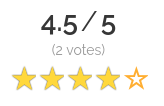The easiest way is with Composer package manager
"require": {
"cymo/entity-rating-bundle": "^1.0"
}Register the bundle:
// app/AppKernel.php
public function registerBundles()
{
$bundles = array(
// ...
new Cymo\Bundle\EntityRatingBundle\CymoEntityRatingBundle(),
// ...
);
}Import routes:
# app/config/routing.yml
cymo_entity_rating:
resource: "@CymoEntityRatingBundle/Resources/config/routing.yml"
prefix: /Extending the abstract entity to create your own
// src/Acme/AppBundle/Entity/EntityRate.php
namespace Acme\AppBundle\Entity;
use Doctrine\ORM\Mapping as ORM;
use Cymo\Bundle\EntityRatingBundle\Entity\EntityRate as BaseEntityRate;
/**
* EntityRate
* @ORM\Table(name="entity_rate")
* @ORM\Entity(repositoryClass="Cymo\Bundle\EntityRatingBundle\Repository\EntityRateRepository")
*/
class EntityRate extends BaseEntityRate
{
/**
* @ORM\Id
* @ORM\Column(type="integer")
* @ORM\GeneratedValue(strategy="AUTO")
*/
protected $id;
/**
* @return mixed
*/
public function getId(): int
{
return $this->id;
}
/**
* @param mixed $id
*/
public function setId($id)
{
$this->id = $id;
}
}Add the annotation to your entity class:
# src/Acme/AppBundle/Entity/Post.php
use Cymo\Bundle\EntityRatingBundle\Annotation\Rated;
...
/**
* Post
* @ORM\Table(name="post")
* ...
* @Rated(min=1, max=5, step=1)
* ...
*/Configure the bundle:
# app/config/config.yml
cymo_entity_rating:
# Your EntityRate namespace, persisted in the DB (according to the namespace of the entity previously created)
entity_rating_class: Acme\AppBundle\Entity\EntityRate
# If you decide to extend the default manager, put the service name here
entity_rating_manager_service: acme.entity_rating.manager
# Maximum number of rate allowed by IP for a given entity
rate_by_ip_limitation: 10
# Map the alias used in frontend and the corresponding class
map_type_to_class:
post: Acme\AppBundle\Entity\Post
# If you need several rated entity, just add them here
article: Acme\AppBundle\Entity\Article
# In order to print the Rating field, pass the template of the field to twig
twig:
form_themes:
- "CymoEntityRatingBundle:form:fields.html.twig"Generate the rating form in the controller:
$entityRatingManager = $this->get('cymo.entity_rating_bundle.manager');
$ratingForm = $entityRatingManager->generateForm(Post::RATING_ALIAS, $post->getId());
$globalRateData = $entityRatingManager->getGlobalRateData($post->getId(), Post::RATING_ALIAS);
/** @var EntityRate $rate */
if ($rate = $entityRatingManager->getUserCurrentRate($post->getId(), Post::RATING_ALIAS)) {
$ratingForm->get('rate')->setData($rate->getRate());
}
return $this->render(
'@AcmeApp/Blog/show.html.twig',
[
'ratingForm' => $ratingForm->createView(),
'globalRateData' => $globalRateData,
]
);Display the form in the view:
{% include 'CymoEntityRatingBundle::ratingWidget.html.twig' with {'form':ratingForm, 'globalRateData':globalRateData} only %}You can import them directly:
JS
<script src="{{ asset('bundles/cymoentityrating/js/entityRating.js') }}"></script>CSS
<link rel="stylesheet" href="{{ asset('bundles/cymoentityrating/css/entityRating.css') }}" type="text/css" media="screen">Or use a task manager (gulp/grunt...) to minify/concat/uglify them before serving them.
new EntityRating({
form : $('.entityrating-form'),
radioButtonClass : '.star-rating-item',
successCallback : function (response) {
var ratingWidgetSelector = $('.entity-rating-widget-wrapper[data-entity-rating-id="' + response.entityRatingId + '"]');
ratingWidgetSelector.find('.entity-rating-rate-container').slideDown();
ratingWidgetSelector.find('*[itemprop="ratingCount"]').text(response.rateData.rateCount);
ratingWidgetSelector.find('*[itemprop="ratingValue"]').text(response.rateData.averageRate);
},
errorCallback : function (response) {
// Do something in case of error
}
});Example: saving the logged user in the rate Entity
- Add the user field to the entity
/**
* @var User
* @ORM\ManyToOne(targetEntity="Acme\AppBundle\Entity\User")
* @ORM\JoinColumn(name="user_id", referencedColumnName="id")
*/
protected $user;
/**
* @return User
*/
public function getUser(): User
{
return $this->user;
}
/**
* @param User $user
*/
public function setUser(User $user)
{
$this->user = $user;
}- Extend the default manager to handle the User
namespace Acme\AppBundle\Manager;
use Cymo\Bundle\EntityRatingBundle\Entity\EntityRateInterface;
use Cymo\Bundle\EntityRatingBundle\Factory\EntityRatingFormFactory;
use Cymo\Bundle\EntityRatingBundle\Manager\EntityRatingManager as BaseEntityRatingManager;
use Doctrine\Common\Annotations\AnnotationReader;
use Doctrine\ORM\EntityManager;
use Symfony\Component\EventDispatcher\EventDispatcherInterface;
use Symfony\Component\Security\Core\Authentication\Token\Storage\TokenStorage;
use Symfony\Component\Security\Core\Authentication\Token\TokenInterface;
class EntityRatingManager extends BaseEntityRatingManager
{
private $user = null;
public function __construct(
AnnotationReader $annotationReader,
EntityRatingFormFactory $formFactory,
EventDispatcherInterface $eventDispatcher,
EntityManager $entityManager,
$entityRatingClass,
$mapTypeToClass,
$rateByIpLimitation,
TokenStorage $tokenStorage
){
parent::__construct($annotationReader, $formFactory, $eventDispatcher, $entityManager, $entityRatingClass, $mapTypeToClass, $rateByIpLimitation);
/** @var TokenInterface $token */
$token = $tokenStorage->getToken();
if ($token !== null && is_object($token->getUser())) {
$this->user = $token->getUser();
}
}
public function getUserCurrentRate($entityId, $entityType, $ignoreFields = [])
{
if ($this->user) {
return $this->entityRateRepository->findOneBy(
[
'entityId' => $entityId,
'entityType' => $entityType,
'user' => $this->user,
]
);
} else {
return parent::getUserCurrentRate($entityId, $entityType, ['user']);
}
}
/**
* @param \Acme\AppBundle\Entity\EntityRate|EntityRateInterface $rate
* @param $entityId
* @param $entityType
* @param $rateValue
*
* @return \Acme\AppBundle\Entity\EntityRate|EntityRateInterface
*/
protected function hydrateEntity(EntityRateInterface $rate, $entityId, $entityType, $rateValue)
{
if ($this->user) {
$rate->setUser($this->user);
}
parent::hydrateEntity($rate, $entityId, $entityType, $rateValue);
return $rate;
}
}- Define a new manager service to use in your controller
acme.entity_rating.manager:
class: Acme\AppBundle\Manager\EntityRatingManager
parent: cymo.entity_rating_bundle.manager
arguments: ['@security.token_storage']The bundle dispatches events when a rate is :
- Created :
cymo.entity_rating.rate_created - Updated :
cymo.entity_rating.rate_updated
